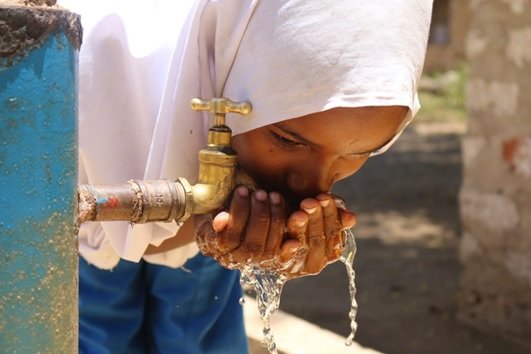Clean Water to Wealth: The SDGs at Work
by Frank McCann, CSJP-A
Water is one of our most precious resources, one that many of us take for granted. Yet, for more than 844 million people worldwide, or one in every nine people on Earth, access to clean and safe water is still out of reach. Women in sub- Saharan Africa spend 16 hours a day collecting water, much of it unsafe to drink. According to the World Health Organization (WHO), unsafe drinking water and lack of water for hygiene and sanitation contributes to approximately 800,000 deaths annually from diarrheal diseases. Most of those deaths are children.
In Kenya’s Kwale County, Juma spent three hours a day getting water. In the dry season, that time extended to five hours and became more dangerous as disputes over the limited supply broke out. a
A man who moved into her neighborhood drilled a well and sold water for two cents per 20 liters. The newfound hours of free time allowed Juma to start a small apparel business. She now makes between $50 and $75.00 per month, which enables her to pay school fees for her children and to participate in the local microfinance cooperative.
Likewise, Mshimu benefitted when she took a volunteer job monitoring the government-provided clean water station in her village. She had a small fruit and vegetable business near her home that she closed due to lack of customers. But Mshimu was able to reopen her stand at the water station where there was plenty of traffic and expand her offering to include fried potatoes, which proved to be popular with the students and teachers in the nearby school. Mshimu now makes between $20 and $30 a day, which pays for schooling for her two youngest daughters and allows her to contribute to a cooperative that will help other women start their enterprises.
In Kenya, the savings and credit cooperatives are called SACCOs. These co-ops traditionally provide capital, mostly for women, to fund small businesses such as small farming, clothing, transport and others. The 25,000-member Murang’a County Women’s Cooperative (MCWS) had a bigger vision and decided to break the mold of members putting their money into each other’s personal enterprises. Instead, they invested in real estate—even though only six percent of the land in Kenya is owned by women. P The women of MCWS, some investing only 10 cents a day, collected over a million dollars that they risked in building a 102-room apartment building. Thankfully, the rooms were quickly rented to students at the Murang’a university where there was a shortage of housing due to doubled enrollment. The explosive growth in students at universities throughout Kenya has prompted MCWS to continue to build youth hostels. These investments by local women now provide income for them.
At the heart of these empowering changes are the United Nations 17 Sustainable Development Goals (SDGs). The lives of these women, their families and villages have been transformed by the enactment of the SDGs, which are intended to create a sustainable global community where everyone has what they need to survive with dignity. The WHO analysis shows that every dollar invested in clean water returns a four-fold economic benefit.
Access to clean water is more than just a health issue. It’s the key to gender equality in the world’s least developed countries. As women can engage in dignified and productive work, they are able to focus on the education of their children, especially the girls. And that is the beginning of making the world a more level playing field.
This article appeared in the Summer 2019 issue of Living Peace.

